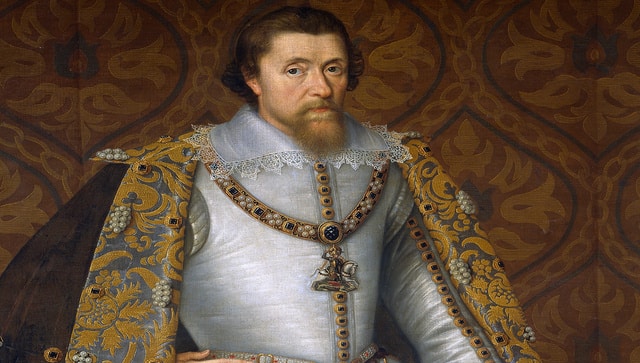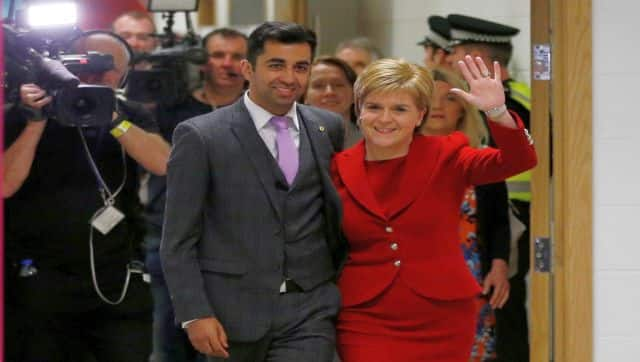Humza Yousaf, the new leader of the Scottish National Party, has vowed to ‘deliver independence’. Yousaf, a Pakistani-origin Member of the Scottish Parliament (MSP), will replace Nicola Sturgeon as Scotland’s new First Minister. Yousaf’s vow has shone a fresh spotlight on Scottish demand for independence from the United Kingdom. Let’s take a closer look at a brief history of Scotland and why the vow of independence will be difficult to achieve: Ancient times As per Smithsonian Magazine, Scotland in ancient times was inhabited by several tribes. The Romans, who turned up fresh after conquering southern Britain in the first century AD, called the locals Caledonians. After some initial success, the Romans struggled to expand their territory in the face of ‘Guerrilla warfare’.
By 212 AD, the Romans left the region.
The Vikings were the next invaders to come calling – in the late 8th Century. In 843, Kenneth MacAplin, a tribal leader, managed to knot together the clans to take on the Vikings. MacAplin thus arguably became Scotland’s first king – making the country one of the world’s oldest states. Modern Scotland After Elizabeth I of England died without leaving an heir, King James VI of Scotland, her first cousin twice removed, took over as monarch of Britain in 1603. James, the son of Mary, Queen of Scots – who was executed by the ‘Virgin Queen’ – would henceforth be known as James I of England. [caption id=“attachment_12364992” align=“alignnone” width=“640”] James I of England. Image courtesy: John de Critz - Prado image, Public Domain[/caption] Though James and his successors ruled over both dominions, Scotland remained an independent state till 1707 – when Great Britain was formed.
James I of England. Image courtesy: John de Critz - Prado image, Public Domain[/caption] Though James and his successors ruled over both dominions, Scotland remained an independent state till 1707 – when Great Britain was formed.
In the 18th Century, England and France found themselves at odds.
Afraid that Scotland would side with the arch-enemy, London blocked trade and deprived Scots of property they owned south of the border unless they agreed to create a single country. After much debate — and widespread Scottish hostility — both the Scottish and English parliaments were dissolved on 1 May, 1707, and replaced with a new British one. Scotland in recent times Today, the United Kingdom of Great Britain and Northern Ireland binds England, Scotland, Wales and Northern Ireland. The UK has an overall population of about 68 million, of which Scots make up some 5.5 million. In 1998, the then Labour government passed the Scotland Act which created the Scottish Parliament and devolved some powers from Westminster. In a 2014 referendum, the Scots voted 55 per cent to 45 per cent to remain in the United Kingdom. At the time, both sides agreed the plebiscite would be a once-in-a-generation poll.
However, nationalists argue that the vote for Brexit two year later changed everything.
While the United Kingdom as a whole voted in favour of leaving the European Union in 2016, a clear majority in Scotland voted to stay in the bloc. Independence supporters say one of the main arguments put forward in 2014 by opponents of a break-up was that an independent Scotland could not join the EU. The SNP’s position The left-wing, nationalist Scottish National Party (SNP), which has run Scotland’s devolved assembly since 2007, also argues that the UK government has pursued policies with which the vast majority of Scots disagree. In the last national election for the UK parliament in 2019, the SNP won 45 per cent of votes cast and 48 of the 59 Scottish seats, while Britain’s ruling right-wing Conservative Party captured just six. In elections for the Scottish parliament in May 2021, the SNP said it would seek to hold a referendum if pro-independence parties won a majority. [caption id=“attachment_12362232” align=“alignnone” width=“640”] Humza Yousaf has been a close ally of former First Minister Nicola Sturgeon and was seen by many as the continuity candidate. He is expected to take forward SNP’s demand for Scottish independence. File image/Reuters[/caption] The SNP together with the Scottish Greens, who also support secession, won more than half of 129 seats in the parliament, giving a pro-independence majority to ensure any referendum bill could be passed. In June, Sturgeon had announced plans to hold an independence referendum on 19 October, 2023. An uphill task But it’s not that easy. Under the Scotland Act, all matters relating to the “Union of the Kingdoms of Scotland and England” are reserved for the UK parliament in London. Westminster can grant the Scottish government the authority to hold a referendum using a so-called “Section 30” order, a process that was used to allow the 2014 plebiscite to go ahead. The UK’s previous prime ministers Liz Truss and Boris Johnson have repeatedly said the 2014 vote should not be repeated for a generation and refused permission for a referendum. Worse for the nationalists, the UK’s top court in November ruled that the Scottish government cannot hold a second referendum on independence without approval from the British parliament. [caption id=“attachment_9994531” align=“alignnone” width=“640”]
Humza Yousaf has been a close ally of former First Minister Nicola Sturgeon and was seen by many as the continuity candidate. He is expected to take forward SNP’s demand for Scottish independence. File image/Reuters[/caption] The SNP together with the Scottish Greens, who also support secession, won more than half of 129 seats in the parliament, giving a pro-independence majority to ensure any referendum bill could be passed. In June, Sturgeon had announced plans to hold an independence referendum on 19 October, 2023. An uphill task But it’s not that easy. Under the Scotland Act, all matters relating to the “Union of the Kingdoms of Scotland and England” are reserved for the UK parliament in London. Westminster can grant the Scottish government the authority to hold a referendum using a so-called “Section 30” order, a process that was used to allow the 2014 plebiscite to go ahead. The UK’s previous prime ministers Liz Truss and Boris Johnson have repeatedly said the 2014 vote should not be repeated for a generation and refused permission for a referendum. Worse for the nationalists, the UK’s top court in November ruled that the Scottish government cannot hold a second referendum on independence without approval from the British parliament. [caption id=“attachment_9994531” align=“alignnone” width=“640”] UK Parliament. File photo[/caption] In the aftermath of that ruling, Sturgeon had repeated her vow to campaign in the next UK-wide election, expected to be held in 2024, solely on a platform of whether Scotland should be independent, making it a “de facto” referendum. “We must and we will find another democratic, lawful and constitutional means by which the Scottish people can express their will. In my view, that can only be an election,” Sturgeon said. Now, with Sturgeon’s resignation, it is up to the 37-year-old Yousaf to fulfill the promise of getting independence done. However, opinion polls since the 2014 vote have mostly continued to show a majority of Scots support remaining in the UK. A YouGov poll conducted between 30 September and 4 October found 45 per cent would back independence.
UK Parliament. File photo[/caption] In the aftermath of that ruling, Sturgeon had repeated her vow to campaign in the next UK-wide election, expected to be held in 2024, solely on a platform of whether Scotland should be independent, making it a “de facto” referendum. “We must and we will find another democratic, lawful and constitutional means by which the Scottish people can express their will. In my view, that can only be an election,” Sturgeon said. Now, with Sturgeon’s resignation, it is up to the 37-year-old Yousaf to fulfill the promise of getting independence done. However, opinion polls since the 2014 vote have mostly continued to show a majority of Scots support remaining in the UK. A YouGov poll conducted between 30 September and 4 October found 45 per cent would back independence.
The rest 55 per cent said they would vote no.
Yousaf had served as the Health and Social Care minister in Sturgeon’s Cabinet until Sturgeon announced her resignation last month, triggering a leadership contest within the governing party for the devolved region. Yousaf defeated his closest rival finance minister Kate Forbes, who spent some of her formative years in India, where her parents worked as Christian missionaries, and now faces a vote at the Scottish Parliament of Holyrood on Tuesday before being formally confirmed as the region’s First Minister. With inputs from agencies Read all the Latest News , Trending News , Cricket News , Bollywood News , India News and Entertainment News here. Follow us on Facebook , Twitter and Instagram .
)